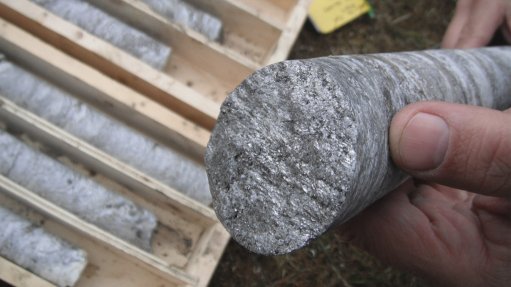
GRAPHITE MINE The Malingunde graphite mine, in Malawi has a maiden mineral resource estimate of 65.1-milllion tonnes at 7.1% total graphitic carbon
South Africa-based integrated infrastructure delivery company AECOM has produced the winning bid for social services for mining company Sovereign Metals’ Malingunde graphite project in the Lilongwe district, in Malawi.
The Malingunde graphite project is prospective for saprolite-hosted flake graphite potential and has a maiden mineral resource estimate of 65.1-milllion tonnes at 7.1% total graphitic carbon (TGC) at a 4% TGC lower cutoff grade.
A scoping study into the Malingunde project estimated that the project could produce 44 000 t/y of concentrate at a capital cost of $29-million, over an initial mine life of 17 years. The study is based on a mineral resource of 65.1-million tonnes. A mine plan could envision an openpit operation.
AECOM received a request for proposal last month from Sovereign Metals’ environmental assessment practitioner (EAP) Dhamana Consulting, which is based in Perth, in Australia.
AECOM senior specialist Karien Lotter explains that the EAP had approached three consulting firms: two in South Africa and one in Malawi, based on industry intelligence and recommendations from other professionals in the field.
Dhamana Consulting is the environmental and social impact assessment (ESIA) service provider, while AECOM is conducting two of the more than ten specialist studies, in addition to the stakeholder engagement for the ESIA process.
“This makes us, with support from our local consultant, the sole provider of social services for the project. Not only was the scope of work in line with the company’s core business, it also has a dedicated team of professionals in this regard,” she explains.
AECOM’s scope of work encompasses stakeholder engagement, social impact assessment (SIA), and the drafting of a resettlement action plan (RAP). These components, comprising part of the ESIA process, are regulated by Malawian legislation, meaning there are specific legal requirements to be met in this regard.
Sovereign Metals opted to conduct its studies to conform to the international financial institution International Finance Corporation’s (IFC’s) performance standards, as well as the United Nations’ Equator Principles. In the event of applying for funding, she explains, these standards serve to mitigate investment risks for financial institutions.
“Conducting studies to these standards is usually an indication that the ESIA considered everything it should have, and that appropriate mitigation and management measures have been developed to minimise the project’s impact on the people and their environment,” she elaborates.
Lotter states that the RAP will be submitted to the Ministry of Lands, Housing and Urban Development for comment and approval. The RAP sets out the plan according to which displaced people will be compensated for losses, physically relocated if required, and how livelihoods will be restored.
The extent of physical and economic displacement is currently being investigated, in collaboration with Sovereign Metals. The aim is to reduce displacement through, among other things, working with the team undertaking the feasibility studies to ensure that social and environmental impacts are considered during the design phase.
Lotter further states that the RAP serves as a mitigation measure to address the impact of land acquisition required by the project. During the RAP process, all landowners and users who stand to be affected by land acquisition, as well as their assets, are identified. Assets are mapped in collaboration with the Department of Lands. Full replacement costs are calculated by means of a market-asset valuation assessment.
“Resettlement planning is a very interactive process because you negotiate and reach agreement on every aspect of resettlement, so as to promote a common understanding and consensus of the conditions under which project-affected people will be moved out of the project area,” Lotter highlights.
Meanwhile, the ESIA process, which AECOM’s scope of work forms a part of, will run for about a year, from November last year. She highlights that the aim is to submit the ESIA report to the Malawian Environmental Affairs Department late this year, in support of an application for environmental authorisation.
The AECOM team comprises principal social development consultant Mark Westbury and senior social consultant Alessandra Awolowo from the UK, who will be conducting the SIA. Independent South African consultant Anelle Lotter will lead the stakeholder engagement and Lotter will work as the resettlement expert. Additionally, consulting firm C12 Consultants, based in Lilongwe, is supporting the ESIA process and AECOM’s activities.
“Challenges associated with the remote location in particular are being mitigated by the good working relationship with Sovereign Metals’ in-country team and our local consultant. Both groups provide ongoing support to enable us to conduct our work, even when we are not in-country,” Lotter concludes.